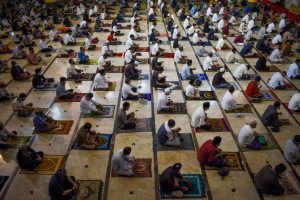We, the Jewish people, still suffering from open wounds of the Holocaust, could have done more to draw the world’s attention to what happened at Srebrenica.
When we say “Never Again,” what do we really mean? It’s not enough to say “never again will we allow the Jewish people to fall victim to genocide.” We must say “never again will we allow ANY people to fall victim to genocide.”July 11, 2020, marks the 25th anniversary of the beginning of the Srebrenica genocide, one of the most horrific atrocities in Europe since the Holocaust. It is incumbent upon us as Jewish people to recognize and remember this tragedy as if it were yesterday.Read More Related Articles
Let that word sink in. Genocide.At 50 years after the end of World War II, nearly 40 years after the establishment of Yad Vashem, and just two years after the dedication of the US Holocaust Memorial Museum, thousands of innocent people were massacred because of their ethnicity and religion while the whole world was watching. We, the Jewish people, still suffering from open wounds of the Holocaust, could have done more to draw the world’s attention to what happened at Srebrenica.Now, 25 years later, we must ensure that it is not forgotten. It is critical that the Jewish people pay tribute to every innocent victim no matter who they were, and unite in the fight against all forms of racism, xenophobia, and discrimination. That includes Islamophobia.Survivors of Srebrenica and their relatives are still traumatized, and many victims are unidentified until this very day. Families did not have a proper burial for their loved ones. They do not have a proper grave at which to mourn their relatives.The Jewish community has experienced discrimination, persecution and extermination throughout our 4,000-year-old history. The World Jewish Congress – established in 1936 and the representative body of Jewish communities in 100 countries – has a long and established history of raising awareness of genocides regardless of the victims’ ethnicity or religion, and for promoting interfaith activities to ‘know each other and the world of the other.’We call on every individual to not stand idly by when discrimination and persecution – on the grounds of ethnicity, religion or belief, disability, or sexual orientation – takes place.Today let us honor the memories of the thousands of Muslims killed at Srebrenica. Let us look deeply into our own hearts and our own memories, and let us say to them: Never again.The writer is a member of the flagship program of the World Jewish Congress, the WJC Jewish Diplomatic Corps, a worldwide network of Jewish young professionals acting in the fields of diplomacy and public policy.




